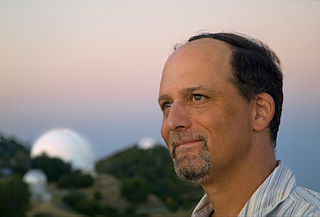A Quote by Alan Stern
Discovering that our solar system has many more planets than we ever expected, and that most of them are ice dwarfs rather than like Earth and the other rocky terrestrials, is just another step in the revolution in viewpoint that removed the Earth from the center of the physical universe and makes Earth all the more special.
Related Quotes
While the Copernican principle comes with no guarantees that it will forever guide us to cosmic truths, it's worked quite well so far: not only is Earth not in the center of the solar system, but the solar system is not in the center of the Milky Way galaxy, the Milky Way galaxy is not in the center of the universe, and it may come to pass that our universe is just one of many that comprise a multiverse. And in case you're one of those people who thinks that the edge may be a special place, we are not at the edge of anything either.
If our solar system is not unusual, then there are so many planets in the universe that, for example, they outnumber the sum of all sounds and words ever uttered by every human who has ever lived. To declare that Earth must be the only planet with life in the universe would be inexcusably bigheaded of us.
Science has an uncomfortable way of pushing human beings from center stage. In our prescientific stories, humans began as the focal point of Nature, living on an Earth that was the center of the universe. As the origins of the Earth and of mankind were investigated more carefully, it became clear that Nature had other interests beyond people, and the Earth was less central than previously hoped. Humankind was just one branch of the great family of life, and the Earth is a smallish planet orbiting an unexceptional sun quite far out on one arm of a run-of-the-mill spiral galaxy.
No one, it has been said, will ever look at the Moon in the same way again. More significantly can one say that no one will ever look at the earth in the same way. Man had to free himself from earth to perceive both its diminutive place in a solar system and its inestimable value as a life -fostering planet. As earthmen, we may have taken another step into adulthood. We can see our planet earth with detachment, with tenderness, with some shame and pity, but at last also with love.
The Earth is the Lord. Everybody walks on the earth. And nobody respects the Earth. Everybody who walks on the earth, shits on the Earth. Spits on the Earth. Don't respect the Earth. So the Earth didn't like it. So the Earth call for a revolution. And the earth is fighting back. The Earth call for a revolution. The Earth call for justice. And the Earth get justice. 'Cause the Earth release ganja. The Earth release herbs.
Hence I feel no shame in asserting that this whole region engirdled by the moon, and the center of the earth, traverse this grand circle amid the rest of the planets in an annual revolution around the sun. Near the sun is the center of the universe. Moreover, since the sun remains stationary, whatever appears as a motion of the sun is really due rather to the motion of the earth.
The Fuse is a solar energy station in orbit 22,000 miles above the earth. But it's more than just a big solar panel array. The Fuse is also home to Midway City, a technically illegal settlement that grew out of a bunch of engineers who decided they'd rather make a new life in space than return home to earth.
Here above the farms and ranches of the Great Plains aviation lives up to the promise that inspired dreamers through the ages. Here you are truly separate from the earth, at least for a little while, removed from the cares and concerns that occupy you on the ground. This separation from the earth is more than symbolic, more than a physical removal - it has an emotional dimension as tangible as the wood, fabric, and steel that has transported you aloft.
A major puzzle for which nobody has an answer is this: is there some size at which the planets change their nature from water-rich planets like Neptune, to rocky planets like the Earth? We have found two planets that are the size of the Earth in radius, but they are very close to their host star, so water on the surface would evaporate away.


































